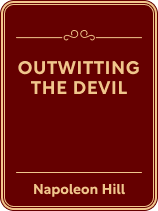

This article is an excerpt from the Shortform book guide to "Outwitting the Devil" by Napoleon Hill. Shortform has the world's best summaries and analyses of books you should be reading.
Like this article? Sign up for a free trial here .
What kind of person does the devil target in particular? Who’s in a better position to resist the devil’s influence?
If you aren’t in control of your own life, the devil is happy to assume that control for you. That’s the view of Napoleon Hill. In his book Outwitting the Devil, he discusses how independent thinkers can resist the devil far more easily than passive people who just drift through life without minds of their own.
Read more to learn what independent thinkers are like and how this makes them stronger.
Independent Thinkers
Hill writes that the Devil distinguishes between two types of people: those under his control, whom he claims make up nearly 98% of all people on Earth; and those who have escaped his influence. What separates these two groups is that those under his influence take a fundamentally passive role in their own lives, while those who have resisted take a more active role. Much of Hill’s advice to the reader encourages them to take on a more active role, taking control of what happens to them out of the Devil’s hands and into their own.
To avoid indifference and coming under the Devil’s control, according to Hill, you must set clear goals and pursue them passionately. The person who knows what they want, thinks for themselves, and refuses to be discouraged by setbacks has escaped the Devil’s influence. We’ll call these people independent thinkers, since Hill repeatedly stresses that their thoughtfulness and questioning of the world around them is what sets them apart.
The characteristics of an independent thinker are as follows:
- They are highly motivated in the pursuit of concrete goals and learn from failure when it comes.
- They make strong personal and professional partners, being confident, generous, honest, and always willing to admit and take responsibility for their mistakes.
- Their goals are the main focus of their lives, and they avoid distractions and unhealthy habits.
| Independent Thinkers Make for Better Leaders Hill’s description of an independent person has much in common with professor and businessman Stephen Covey’s description of mature and effective leaders from his book The 7 Habits of Highly Effective People. According to Covey, what makes someone professionally successful is their ability to prioritize and devote themselves toward a single goal, their willingness to listen to and try to understand others, and their dedication to constantly improving themselves—roughly aligning with Hill’s three characteristics. Hill and Covey differ slightly in that Hill is more interested in taking control of your own life, while Covey focuses on negotiation and working well with others (we especially see this difference in focus in Covey’s follow-up book, The 8th Habit). Even so, Hill makes a point to stress that an independent person doesn’t just improve their own lives, but the lives of the people around them as well, becoming a more productive member of society and better partners to those who are similarly motivated. |

———End of Preview———
Like what you just read? Read the rest of the world's best book summary and analysis of Napoleon Hill's "Outwitting the Devil" at Shortform .
Here's what you'll find in our full Outwitting the Devil summary :
- How failure and bad habits keep people from reaching their potential
- How to escape the Devil’s influence and avoid being turned toward inaction
- How to find your way to professional and financial success






